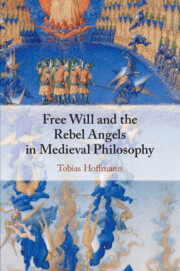Book contents
- Free Will and the Rebel Angels in Medieval Philosophy
- Free Will and the Rebel Angels in Medieval Philosophy
- Copyright page
- Dedication
- Contents
- Acknowledgments
- Abbreviations
- Citation Method
- Introduction
- Part I Free Will
- Part II Whence Evil?
- Part III Angelic Sin
- Chapter 8 Intellectualist Accounts of the Angelic Fall
- Chapter 9 Voluntarist and Intermediary Accounts of the Angelic Fall
- Chapter 10 Necessary (and Free?) Obstinacy
- Conclusion
- Bibliography
- Index of Manuscripts
- Index
Conclusion
from Part III - Angelic Sin
Published online by Cambridge University Press: 26 November 2020
- Free Will and the Rebel Angels in Medieval Philosophy
- Free Will and the Rebel Angels in Medieval Philosophy
- Copyright page
- Dedication
- Contents
- Acknowledgments
- Abbreviations
- Citation Method
- Introduction
- Part I Free Will
- Part II Whence Evil?
- Part III Angelic Sin
- Chapter 8 Intellectualist Accounts of the Angelic Fall
- Chapter 9 Voluntarist and Intermediary Accounts of the Angelic Fall
- Chapter 10 Necessary (and Free?) Obstinacy
- Conclusion
- Bibliography
- Index of Manuscripts
- Index
Summary
As the foregoing study has shown, beginning in the 1220s, the reception of Aristotle’s action theory by Christian thinkers enabled the development of a psychological approach to free will, which raised philosophical reflection on free will to an unprecedented level. Aristotle’s thought enabled later medieval thinkers to articulate more clearly the rational process that leads to a choice, and it provided the tools for them to develop more refined theories of the way in which decision-making is rooted in the powers of the soul. According to the close reading of Aristotle proposed by Thomas Aquinas and others, there cannot be any discrepancy between a choice and the practical judgment that concludes deliberation. But this hypothesis raised concerns about the relation between cognition and volition: Is a choice (or any other kind of volition, such as desire or enjoyment) an inevitable response to a judgment about what is worth choosing?
- Type
- Chapter
- Information
- Free Will and the Rebel Angels in Medieval Philosophy , pp. 263 - 266Publisher: Cambridge University PressPrint publication year: 2020



